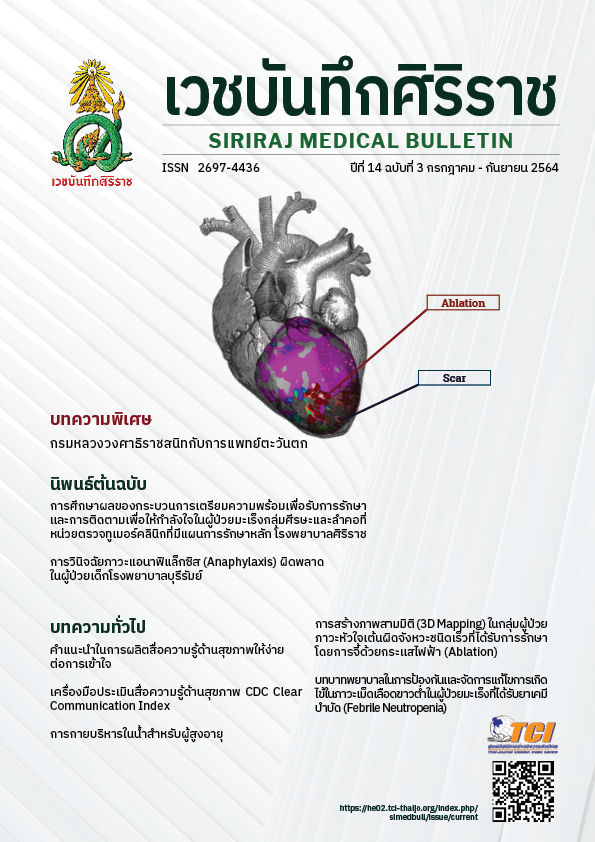A Guideline of Creating Easy-to-Understand Health Education Materials
Main Article Content
Abstract
This article is intended to provide guidelines of developing the quality of health education materials leading to the improvement of health literacy. By applying the practice of health information communication, in addition to international principles of health material development into the guidelines, materials could effectively inform patients of Siriraj Hospital and the public. Healthcare materials should be academically accurate, direct and well designed in order to reach its maximize potential which is to influence healthy behaviors among the reader. The authors divided the guideline into two parts: creating appropriate scope of content and designing information to be easy to understand. The first part includes analyzing the target audience, factors and determining main points and contents. The second part includes designing central message through tailoring content, optimizing colors, fonts, sizes, pictures and composition. Despite the fact that this article’s direct aim is print media, a diverse channel of health communication is also suggested to follow. Furthermore, organizations with missions involving creating the health education materials could adopt these guidelines to provide a better and more effective health communication between professionals and target groups.
Article Details
References
สำนักงานโครงการขับเคลื่อนกรมอนามัย4.0 เพื่อความรอบรู้ด้านสุขภาพของประชาชนกรมอนามัย กระทรวงสาธารณสุข . HLO Fact Sheet [อินเทอร์เน็ต]. 2017. [เข้าถึงเมื่อ 10 กันยายน2561]. เข้าถึงได้จาก: http://dohhl.anamai.moph.go.th/download/2561/HLO_fact%20sheet_oct2017.pdf
Nutbeam D: Health literacy as a public health goal: a challenge for contemporary health education and communication strategies into the 21st century. Health Promotion International [internet]. 2000. [cited 2018 Oct 20];15(3):[262]. Available from:https://doi.org/10.1093/heapro/15.3.259
ชนวนทอง ธนสุกาญจน์. บทบรรณาธิการ บทเรียนการพัฒนาความรอบรู้ด้านสุขภาพจากนานาชาติสู่แผนการพัฒนาของประเทศไทย. วารสารสาธารณสุขศาสตร์ [อินเทอร์เน็ต]. 2561. [เข้าถึงเมื่อ15 ต.ค. 2561];48(1):[หน้า 1-4]. เข้าถึงได้จาก https://www.ph.mahidol.ac.th/thjph/journal/48_1/00.pdf
McGuire WJ. Attitudes and attitude change. In Lindzey, G., Aronson, E. (Eds.), Handbook of social psychology (3rd ed., Vol. 2, pp. 233–346). New York, NY: Random House; 1985
สำนักงานโครงการขับเคลื่อนกรมอนามัย4.0 เพื่อความรอบรู้ด้านสุขภาพของประชาชนกรมอนามัย กระทรวงสาธารณสุข. แบบประเมินตนเองในการเป็นองค์กรรอบรู้ด้านสุขภาพรศ. ดร. ชะนวนทอง ธนสุกาญจน์[อินเทอร์เน็ต]. 2017. [เข้าถึงเมื่อ 30 ม.ค. 2561]. เข้าถึงได้จาก:http://dohhl.anamai.moph.go.th/download/2561/แบบประเมิน%20HLO%20สำหรับหน่วยงานด้านสุขภาพและหน่วยงานอื่นๆ.pdf
CDC. Simply put; a guide for creating easy-to-understand materials. 3rd ed. Atlanta, GA: Strategic and Proactive Communication Branch, Division of Communication Services, Office of the Associate Director for Communication, Centers for Disease Control and Prevention; 2010.
Centers for Disease Control and Prevention (CDC). CDC Clear Communication Index A Tool for Developing and Assessing CDC Public Communication Products User Guide. Atlanta, GA: Centers for Disease Control and Prevention Office of the Associate Director for Communication; 2019.
CDC. [Internet]. CDC Clear Communication Index Score Sheet. 2014 [cited 16 December 2019]. Available from: https://www.cdc.gov/ccindex/pdf/full-index-score-sheet.pdf
Abrams M, Kurtz-Rossi S, Riffenburgh A, Savage B. Health Literacy Guidebook | UnityPoint Health [Internet]. Healthliterateorganization.org. 2014 [cited 8 July 2019]. Available from: http://www.HealthLiterateOrganization.org






